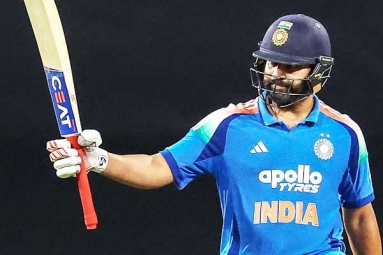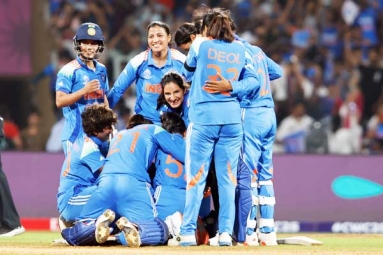
(Image source from: x.com/BCCI)
For around 10 overs, Pakistan looked like they might create an exciting cricket match against India, which has become uncommon in recent times, but they faded against India's strong bowling. Nevertheless, their total of 171 was the highest they have ever made when batting first against India, yet it ended the same way their defenses usually do against India: in loss, this time with seven balls remaining. Abhishek Sharma and Shubman Gill easily chased down the target, never appearing stressed, beginning with a six on the first ball and putting together a 105-run partnership for the first wicket in just 59 balls. This made it easier for the middle order when scoring became tougher against the older ball. Gill made 47 runs off 28 balls, while Abhishek, who had previously dropped Sahibzada Farhan in the first over, ended up with 74 off 39, leaving India needing just 49 runs off 46 balls when he got out. Farhan managed to score a fifty, hinting at a potential contest, but it seemed like he had to really push himself to achieve that. He also contributed to Pakistan's slowdown by scoring only 7 runs off 11 balls after reaching fifty, and Pakistan went 39 legal deliveries without hitting a boundary.
Although chasing the target looked easy, the rising tensions between the teams occasionally became evident. India's batters seemed more careful about encouraging each other as the players from both sides interacted for the first time in over one and a half matches. India remained calmer: Farhan swung his bat confidently after scoring fifty, while Abhishek blew kisses after his milestone. Their celebrations showed how much effort they put into achieving their respective scores. Pakistan decided to give the struggling Saim Ayub a break from opening, which worked out as Fakhar Zaman started quickly, followed by Farhan. Pakistan achieved their best powerplay performance against India, scoring 55 runs for 1 wicket. Jasprit Bumrah bowled three overs during the first six for the third consecutive match, recording his most expensive T20I powerplay with 34 runs.
Before this match, only Oman and UAE were slower than Pakistan in the middle overs during this Asia Cup. Pakistan had been scoring less than a run per ball, but this time they hit three sixes in overs 8-10, off Kuldeep Yadav, Varun Chakravarthy, and Axar Patel. The fourth six brought Farhan to his half-century. After doing the hard work, Pakistan collapsed. The decline started against Shivam Dube, whose role as a sixth bowler in this tournament will please India greatly. Dube didn’t give the batters any pace, avoided their swinging arcs, and took out both Ayub and Farhan after they had put together 72 runs for the second wicket. The skill of Varun and Kuldeep then showed, as they held Pakistan back despite only taking one wicket between them. Faheem Ashraf’s unbeaten 20 runs off 8 balls added some respect to the total.
It started looking much brighter when Abhishek hit the first ball of the chase for a six. Gill and Abhishek attacked the bowlers, taking advantage of the new ball and the speed offered by Shaheen Shah Afridi. India's score of 69 runs without losing any wickets was the best start in the powerplay for this Asia Cup, and it was also the best for India against Pakistan. Abhishek kept hitting over the infield while Gill found openings in the field, and they ensured they remained united whenever any tension arose. The tension peaked when Abhishek and Rauf faced off after Gill hit the latter for a four. Ashraf gave Pakistan their first breakthrough by bowling Gill, right after he received treatment for cramps. Suryakumar Yadav was then dismissed without scoring, but Abhishek continued to hit the ball well, targeting Abrar Ahmed, who was possibly Pakistan's biggest threat. Even though Abrar finally took his wicket, Abhishek scored 32 runs off 12 balls against him, which included four sixes.
India faced a short pause similar to Pakistan’s, as Sanju Samson and Tilak Varma had difficulty adjusting to the old ball that wasn't coming onto the bat well. Samson managed only 13 runs off 17 balls, but Tilak guided India through with some sixes off Rauf and Afridi in the 18th and 19th overs.






















